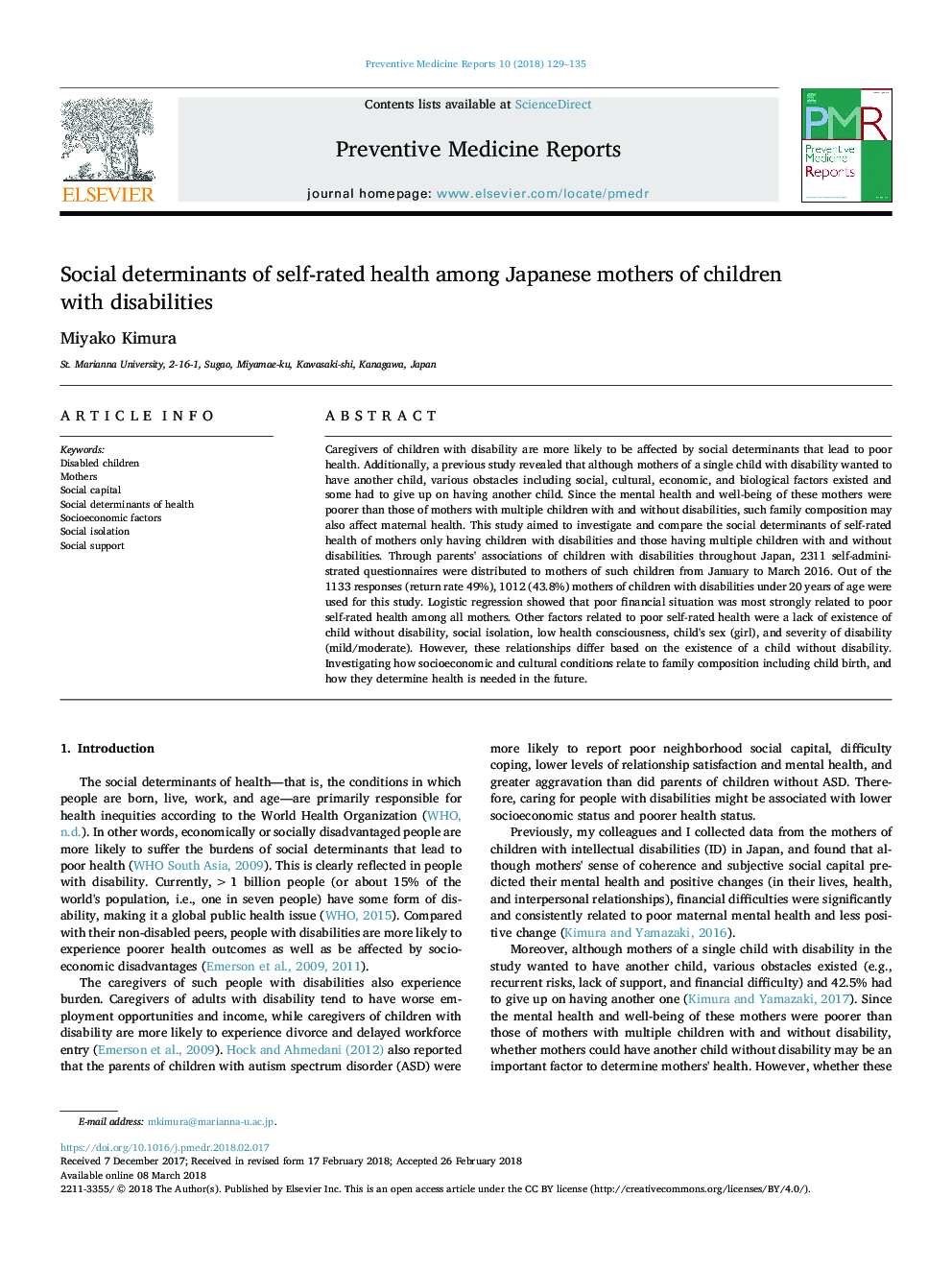| کد مقاله | کد نشریه | سال انتشار | مقاله انگلیسی | نسخه تمام متن |
|---|---|---|---|---|
| 8818574 | 1609082 | 2018 | 7 صفحه PDF | دانلود رایگان |
عنوان انگلیسی مقاله ISI
Social determinants of self-rated health among Japanese mothers of children with disabilities
ترجمه فارسی عنوان
تعیین کننده های اجتماعی سلامت خود در میان مادران ژاپنی کودکان معلول
دانلود مقاله + سفارش ترجمه
دانلود مقاله ISI انگلیسی
رایگان برای ایرانیان
کلمات کلیدی
کودکان معلول، مادران، سرمایه اجتماعی، تعیین کننده های اجتماعی سلامت، عوامل اجتماعی-اقتصادی، انزوای اجتماعی، حمایت اجتماعی،
ترجمه چکیده
مراقبان کودکانی که دارای معلولیت هستند بیشتر احتمال دارد تحت تاثیر عوامل اجتماعی قرار بگیرند که موجب سلامت ضعیف می شود. علاوه بر این، یک مطالعه قبلی نشان داد که اگر چه مادران یک کودک دارای معلولیت می خواستند که یک کودک دیگر داشته باشند، موانع متعددی از قبیل عوامل اجتماعی، فرهنگی، اقتصادی و زیست شناختی وجود داشته و بعضی از آنها باید از داشتن فرزند دیگر خودداری کنند. از آنجایی که سلامت روان و رفاه این مادران فقیرتر از مادرانی است که دارای چندین کودک دارای معلولیت و معلولیت هستند، چنین ترکیب خانواده نیز ممکن است بر سلامت مادر تاثیر بگذارد. این مطالعه با هدف بررسی و مقایسه عوامل موثر بر سلامت خودسوزی مادرانی که تنها کودکان معلول دارند و کودکان متعدد و با معلولیت دارند. از طریق ارتباطات والدین کودکان معلول در سراسر ژاپن، 2311 پرسشنامه خودآموزی از مادران این کودکان از ژانویه تا مارچ 2016 توزیع شد. از 1133 پاسخ (نرخ بازگشت 49٪)، 1012 (43.8٪) مادران کودکان با معلولیت های زیر 20 ساله در سن 20 سالگی برای این مطالعه مورد استفاده قرار گرفت. رگرسیون لجستیک نشان داد که وضعیت مالی ضعیف بیشتر مربوط به سلامت ضعیف خود در میان تمام مادران است. سایر عوامل مرتبط با سلامت ضعیف خود، عدم وجود کودکی بدون معلولیت، انزوای اجتماعی، آگاهی کم سلامت، جنس (دختر) و شدت معلولیت (خفیف / متوسط) بود. با این حال، این روابط بر اساس وجود یک کودک بدون معلولیت متفاوت است. بررسی در مورد شرایط اجتماعی-اقتصادی و فرهنگی مربوط به ترکیب خانواده، از جمله تولد فرزند و نحوه تعیین سلامت در آینده مورد نیاز است.
موضوعات مرتبط
علوم پزشکی و سلامت
پزشکی و دندانپزشکی
سیاست های بهداشت و سلامت عمومی
چکیده انگلیسی
Caregivers of children with disability are more likely to be affected by social determinants that lead to poor health. Additionally, a previous study revealed that although mothers of a single child with disability wanted to have another child, various obstacles including social, cultural, economic, and biological factors existed and some had to give up on having another child. Since the mental health and well-being of these mothers were poorer than those of mothers with multiple children with and without disabilities, such family composition may also affect maternal health. This study aimed to investigate and compare the social determinants of self-rated health of mothers only having children with disabilities and those having multiple children with and without disabilities. Through parents' associations of children with disabilities throughout Japan, 2311 self-administrated questionnaires were distributed to mothers of such children from January to March 2016. Out of the 1133 responses (return rate 49%), 1012 (43.8%) mothers of children with disabilities under 20â¯years of age were used for this study. Logistic regression showed that poor financial situation was most strongly related to poor self-rated health among all mothers. Other factors related to poor self-rated health were a lack of existence of child without disability, social isolation, low health consciousness, child's sex (girl), and severity of disability (mild/moderate). However, these relationships differ based on the existence of a child without disability. Investigating how socioeconomic and cultural conditions relate to family composition including child birth, and how they determine health is needed in the future.
ناشر
Database: Elsevier - ScienceDirect (ساینس دایرکت)
Journal: Preventive Medicine Reports - Volume 10, June 2018, Pages 129-135
Journal: Preventive Medicine Reports - Volume 10, June 2018, Pages 129-135
نویسندگان
Miyako Kimura,
